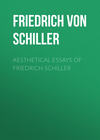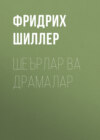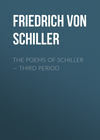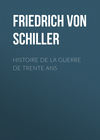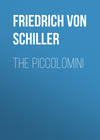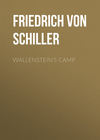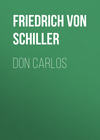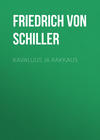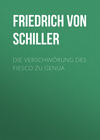Kitabı oku: «Aesthetical Essays of Friedrich Schiller», sayfa 10
LETTER XXV
Whilst man, in his first physical condition, is only passively affected by the world of sense, he is still entirely identified with it; and for this reason the external world, as yet, has no objective existence for him. When he begins in his aesthetic state of mind to regard the world objectively, then only is his personality severed from it, and the world appears to him an objective reality, for the simple reason that he has ceased to form an identical portion of it.
That which first connects man with the surrounding universe is the power of reflective contemplation. Whereas desire seizes at once its object, reflection removes it to a distance and renders it inalienably her own by saving it from the greed of passion. The necessity of sense which he obeyed during the period of mere sensations, lessens during the period of reflection; the senses are for the time in abeyance; even ever-fleeting time stands still whilst the scattered rays of consciousness are gathering and shape themselves; an image of the infinite is reflected upon the perishable ground. As soon as light dawns in man, there is no, longer night outside of him; as soon as there is peace within him the storm lulls throughout the universe, and the contending forces of nature find rest within prescribed limits. Hence we cannot wonder if ancient traditions allude to these great changes in the inner man as to a revolution in surrounding nature, and symbolize thought triumphing over the laws of time, by the figure of Zeus, which terminates the reign of Saturn.
As long as man derives sensations from a contact with nature, he is her slave; but as soon as he begins to reflect upon her objects and laws he becomes her lawgiver. Nature, which previously ruled him as a power, now expands before him as an object. What is objective to him can have no power over him, for in order to become objective it has to experience his own power. As far and as long as he impresses a form upon matter, he cannot be injured by its effect; for a spirit can only be injured by that which deprives it of its freedom. Whereas he proves his own freedom by giving a form to the formless; where the mass rules heavily and without shape, and its undefined outlines are for ever fluctuating between uncertain boundaries, fear takes up its abode; but man rises above any natural terror as soon as he knows how to mould it, and transform it into an object of his art. As soon as he upholds his independence towards phenomenal natures he maintains his dignity toward her as a thing of power, and with a noble freedom he rises against his gods. They throw aside the mask with which they had kept him in awe during his infancy, and to his surprise his mind perceives the reflection of his own image. The divine monster of the Oriental, which roams about changing the world with the blind force of a beast of prey, dwindles to the charming outline of humanity in Greek fable; the empire of the Titans is crushed, and boundless force is tamed by infinite form.
But whilst I have been merely searching for an issue from the material world, and a passage into the world of mind, the bold flight of my imagination has already taken me into the very midst of the latter world. The beauty of which we are in search we have left behind by passing from the life of mere sensations to the pure form and to the pure object. Such a leap exceeds the condition of human nature; in order to keep pace with the latter we must return to the world of sense.
Beauty is indeed the sphere of unfettered contemplation and reflection; beauty conducts us into the world of ideas, without however taking us from the world of sense, as occurs when a truth is perceived and acknowledged. This is the pure product of a process of abstraction from everything material and accidental, a pure object free from every subjective barrier, a pure state of self-activity without any admixture of passive sensations. There is indeed a way back to sensation from the highest abstraction; for thought teaches the inner sensation, and the idea of logical or moral unity passes into a sensation of sensual accord. But if we delight in knowledge we separate very accurately our own conceptions from our sensations; we look upon the latter as something accidental, which might have been omitted without the knowledge being impaired thereby, without truth being less true. It would, however, be a vain attempt to suppress this connection of the faculty of feeling with the idea of beauty, consequently, we shall not succeed in representing to ourselves one as the effect of the other, but we must look upon them both together and reciprocally as cause and effect. In the pleasure which we derive from knowledge we readily distinguish the passage from the active to the passive state, and we clearly perceive that the first ends when the second begins. On the contrary, from the pleasure which we take in beauty, this transition from the active to the passive is not perceivable, and reflection is so intimately blended with feeling that we believe we feel the form immediately. Beauty is then an object to us, it is true, because reflection is the condition of the feeling which we have of it; but it is also a state of our personality (our Ego) because the feeling is the condition of the idea we conceive of it: beauty is therefore doubtless form, because we contemplate it, but it is equally life because we feel it. In a word, it is at once our state and our act. And precisely because it is at the same time both a state and an act, it triumphantly proves to us that the passive does not exclude the active, neither matter nor form, neither the finite nor the infinite; and that consequently the physical dependence to which man is necessarily devoted does not in any way destroy his moral liberty. This is the proof of beauty, and I ought to add that this alone can prove it. In fact, as in the possession of truth or of logical unity, feeling is not necessarily one with the thought, but follows it accidentally; it is a fact which only proves that a sensitive nature can succeed a rational nature, and vice versa; not that they co-exist, that they exercise a reciprocal action one over the other; and, lastly, that they ought to be united in an absolute and necessary manner. From this exclusion of feeling as long as there is thought, and of thought so long as there is feeling, we should on the contrary conclude that the two natures are incompatible, so that in order to demonstrate that pure reason is to be realized in humanity, the best proof given by the analysis is that this realization is demanded. But, as in the realization of beauty or of aesthetic unity, there is a real union, mutual substitution of matter and of form, of passive and of active, by this alone is proved the compatibility of the two natures, the possible realization of the infinite in the finite, and consequently also the possibility of the most sublime humanity.
Henceforth we need no longer be embarrassed to find a transition from dependent feeling to moral liberty, because beauty reveals to us the fact that they can perfectly coexist, and that to show himself a spirit, man need not escape from matter. But if on one side he is free, even in his relation with a visible world, as the fact of beauty teaches, and if on the other side freedom is something absolute and supersensuous, as its idea necessarily implies, the question is no longer how man succeeds in raising himself from the finite to the absolute, and opposing himself in his thought and will to sensuality, as this has already been produced in the fact of beauty. In a word, we have no longer to ask how he passes from virtue to truth which is already included in the former, but how he opens a way for himself from vulgar reality to aesthetic reality, and from the ordinary feelings of life to the perception of the beautiful.
LETTER XXVI
I have shown in the previous letters that it is only the aesthetic disposition of the soul that gives birth to liberty, it cannot therefore be derived from liberty nor have a moral origin. It must be a gift of nature; the favor of chance alone can break the bonds of the physical state and bring the savage to duty. The germ of the beautiful will find an equal difficulty in developing itself in countries where a severe nature forbids man to enjoy himself, and in those where a prodigal nature dispenses him from all effort; where the blunted senses experience no want, and where violent desire can never be satisfied. The delightful flower of the beautiful will never unfold itself in the case of the Troglodyte hid in his cavern always alone, and never finding humanity outside himself; nor among nomads, who, travelling in great troops, only consist of a multitude, and have no individual humanity. It will only flourish in places where man converses peacefully with himself in his cottage, and with the whole race when he issues from it. In those climates where a limpid ether opens the senses to the lightest impression, whilst a life-giving warmth develops a luxuriant nature, where even in the inanimate creation the sway of inert matter is overthrown, and the victorious form ennobles even the most abject natures; in this joyful state and fortunate zone, where activity alone leads to enjoyment, and enjoyment to activity, from life itself issues a holy harmony, and the laws of order develop life, a different result takes place. When imagination incessantly escapes from reality, and does not abandon the simplicity of nature in its wanderings: then and there only the mind and the senses, the receptive force and the plastic force, are developed in that happy equilibrium which is the soul of the beautiful and the condition of humanity.
What phenomenon accompanies the initiation of the savage into humanity? However far we look back into history the phenomenon is identical among all people who have shaken off the slavery of the animal state: the love of appearance, the inclination for dress and for games.
Extreme stupidity and extreme intelligence have a certain affinity in only seeking the real and being completely insensible to mere appearance. The former is only drawn forth by the immediate presence of an object in the senses, and the second is reduced to a quiescent state only by referring conceptions to the facts of experience. In short, stupidity cannot rise above reality, nor the intelligence descend below truth. Thus, in as far as the want of reality and attachment to the real are only the consequence of a want and a defect, indifference to the real and an interest taken in appearances are a real enlargement of humanity and a decisive step towards culture. In the first place it is the proof of an exterior liberty, for as long as necessity commands and want solicits, the fancy is strictly chained down to the real: it is only when want is satisfied that it develops without hinderance. But it is also the proof of an internal liberty, because it reveals to us a force which, independent of an external substratum, sets itself in motion, and has sufficient energy to remove from itself the solicitations of nature. The reality of things is effected by things, the appearance of things is the work of man, and a soul that takes pleasure in appearance does not take pleasure in what it receives but in what it makes.
It is self-evident that I am speaking of aesthetical evidence different from reality and truth, and not of logical appearance identical with them. Therefore if it is liked it is because it is an appearance, and not because it is held to be something better than it is: the first principle alone is a play, whilst the second is a deception. To give a value to the appearance of the first kind can never injure truth, because it is never to be feared that it will supplant it – the only way in which truth can be injured. To despise this appearance is to despise in general all the fine arts of which it is the essence. Nevertheless, it happens sometimes that the understanding carries its zeal for reality as far as this intolerance, and strikes with a sentence of ostracism all the arts relating to beauty in appearance, because it is only an appearance. However, the intelligence only shows this vigorous spirit when it calls to mind the affinity pointed out further back. I shall find some day the occasion to treat specially of the limits of beauty in its appearance.
It is nature herself which raises man from reality to appearance by endowing him with two senses which only lead him to the knowledge of the real through appearance. In the eye and the ear the organs of the senses are already freed from the persecutions of nature, and the object with which we are immediately in contact through the animal senses is remoter from us. What we see by the eye differs from what we feel; for the understanding to reach objects overleaps the light which separates us from them. In truth, we are passive to an object: in sight and hearing the object is a form we create. While still a savage, man only enjoys through touch merely aided by sight and sound. He either does not rise to perception through sight, or does not rest there. As soon as he begins to enjoy through sight, vision has an independent value, he is aesthetically free, and the instinct of play is developed.
The instinct of play likes appearance, and directly it is awakened it is followed by the formal imitative instinct which treats appearance as an independent thing. Directly man has come to distinguish the appearance from the reality, the form from the body, he can separate, in fact he has already done so. Thus the faculty of the art of imitation is given with the faculty of form in general. The inclination that draws us to it reposes on another tendency I have not to notice here. The exact period when the aesthetic instinct, or that of art, develops, depends entirely on the attraction that mere appearance has for men.
As every real existence proceeds from nature as a foreign power, whilst every appearance comes in the first place from man as a percipient subject, he only uses his absolute sight in separating semblance from essence, and arranging according to subjective law. With an unbridled liberty he can unite what nature has severed, provided he can imagine his union, and he can separate what nature has united, provided this separation can take place in his intelligence. Here nothing can be sacred to him but his own law: the only condition imposed upon him is to respect the border which separates his own sphere from the existence of things or from the realm of nature.
This human right of ruling is exercised by man in the art of appearance; and his success in extending the empire of the beautiful, and guarding the frontiers of truth, will be in proportion with the strictness with which he separates form from substance: for if he frees appearance from reality, he must also do the converse.
But man possesses sovereign power only in the world of appearance, in the unsubstantial realm of imagination, only by abstaining from giving being to appearance in theory, and by giving it being in practice. It follows that the poet transgresses his proper limits when he attributes being to his ideal, and when he gives this ideal aim as a determined existence. For he can only reach this result by exceeding his right as a poet, that of encroaching by the ideal on the field of experience, and by pretending to determine real existence in virtue of a simple possibility, or else he renounces his right as a poet by letting experience encroach on the sphere of the ideal, and by restricting possibility to the conditions of reality.
It is only by being frank or disclaiming all reality, and by being independent or doing without reality, that the appearance is aesthetical. Directly it apes reality or needs reality for effect, it is nothing more than a vile instrument for material ends, and can prove nothing for the freedom of the mind. Moreover, the object in which we find beauty need not be unreal if our judgment disregards this reality; for if it regards this the judgment is no longer aesthetical. A beautiful woman, if living, would no doubt please us as much and rather more than an equally beautiful woman seen in painting; but what makes the former please men is not her being an independent appearance; she no longer pleases the pure aesthetic feeling. In the painting, life must only attract as an appearance, and reality as an idea. But it is certain that to feel in a living object only the pure appearance requires a greatly higher aesthetic culture than to do without life in the appearance.
When the frank and independent appearance is found in man separately, or in a whole people, it may be inferred they have mind, taste, and all prerogatives connected with them. In this case the ideal will be seen to govern real life, honor triumphing over fortune, thought over enjoyment, the dream of immortality over a transitory existence.
In this case public opinion will no longer be feared, and an olive crown will be more valued than a purple mantle. Impotence and perversity alone have recourse to false and paltry semblance, and individuals as well as nations who lend to reality the support of appearance, or to the aesthetic appearance the support of reality, show their moral unworthiness and their aesthetical impotence. Therefore, a short and conclusive answer can be given to this question – how far will appearance be permitted in the moral world? It will run thus in proportion as this appearance will be aesthetical, that is, an appearance that does not try to make up for reality, nor requires to be made up for by it. The aesthetical appearance can never endanger the truth of morals: wherever it seems to do so the appearance is not aesthetical. Only a stranger to the fashionable world can take the polite assurances, which are only a form, for proofs of affection, and say he has been deceived; but only a clumsy fellow in good society calls in the aid of duplicity and flatters to become amiable. The former lacks the pure sense for independent appearance; therefore he can only give a value to appearance by truth. The second lacks reality, and wishes to replace it by appearance. Nothing is more common than to hear depreciators of the times utter these paltry complaints – that all solidity has disappeared from the world, and that essence is neglected for semblance. Though I feel by no means called upon to defend this age against these reproaches, I must say that the wide application of these criticisms shows that they attach blame to the age, not only on the score of the false, but also of the frank appearance. And even the exceptions they admit in favor of the beautiful have for their object less the independent appearance than the needy appearance. Not only do they attack the artificial coloring that hides truth and replaces reality, but also the beneficent appearance that fills a vacuum and clothes poverty; and they even attack the ideal appearance that ennobles a vulgar reality. Their strict sense of truth is rightly offended by the falsity of manners; unfortunately, they class politeness in this category. It displeases them that the noisy and showy so often eclipse true merit, but they are no less shocked that appearance is also demanded from merit, and that a real substance does not dispense with an agreeable form. They regret the cordiality, the energy, and solidity of ancient times; they would restore with them ancient coarseness, heaviness, and the old Gothic profusion. By judgments of this kind they show an esteem for the matter itself unworthy of humanity, which ought only to value the matter inasmuch as it can receive a form and enlarge the empire of ideas. Accordingly, the taste of the age need not much fear these criticisms if it can clear itself before better judges. Our defect is not to grant a value to aesthetic appearance (we do not do this enough): a severe judge of the beautiful might rather reproach us with not having arrived at pure appearance, with not having separated clearly enough existence from the phenomenon, and thus established their limits. We shall deserve this reproach so long as we cannot enjoy the beautiful in living nature without desiring it; as long as we cannot admire the beautiful in the imitative arts without having an end in view; as long as we do not grant to imagination an absolute legislation of its own; and as long as we do not inspire it with care for its dignity by the esteem we testify for its works.
